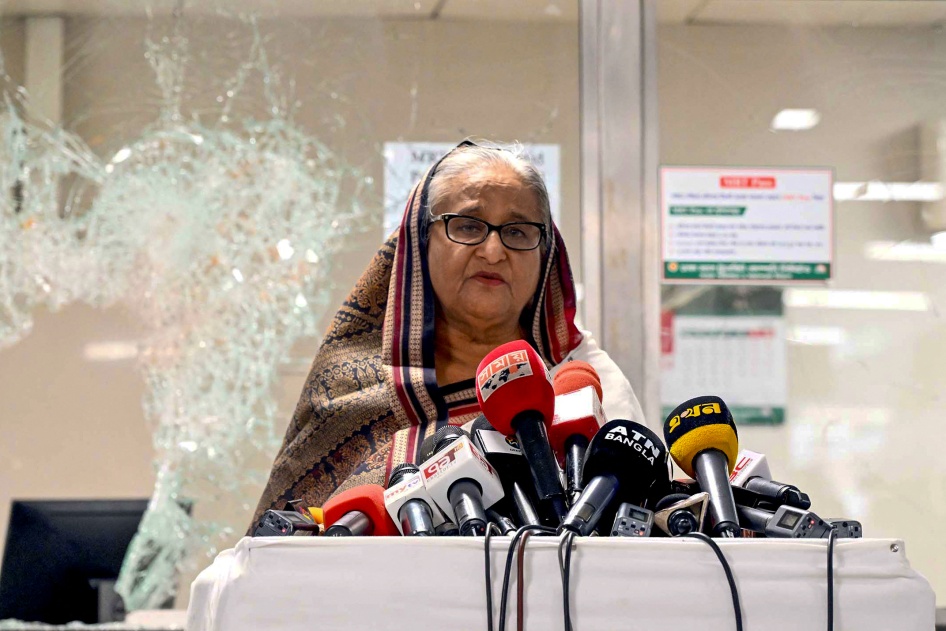(London) – Bangladesh Prime Minister Sheikh Hasina resigned on August 5, 2024, and fled the country after weeks of student protests, Human Rights Watch said today. An estimated 300 people have been killed, thousands injured, and more than 10,000 arrested.
The army chief general, Waker-Uz-Zaman, said, “I promise you all, we will bring justice” while announcing the prime minister’s resignation and confirming that an interim government would be formed. The authorities should prioritize implementing a transparent and independent justice mechanism and immediately release all political prisoners, including those being held in incommunicado detention. The interim government should accept the United Nations’ support to open an independent inquiry into grave abuses both during the recent student protests and earlier, during the years of Sheikh Hasina’s government.
“Sheikh Hasina’s resignation after nearly 15 years of increasing authoritarianism brings new hope for accountability and democratic reform to Bangladesh,” said Meenakshi Ganguly, deputy Asia director at Human Rights Watch. “The interim government should seize this opportunity to reorient the country toward the rule of law with independent institutions to assure justice for the victims.”
The prime minister’s resignation was the culmination of student protests that began in early July. The protesters initially were responding to the reinstatement of a 30 percent job quota for descendants of 1971 independence war veterans, which they described as a form of political patronage for ruling party supporters. Though the protests began peacefully, violence broke out on July 15, when security forces and members of the Chhatra League, the governing Awami League’s student group, attacked the protesters.
In response, students took to the streets. They had widespread support from Bangladeshis, who said they were not only appalled by the attack on students but also expressed anger over corruption, unfair elections, and rampant abuses by security forces. The government deployed the army and shut down internet access, during which activists reported extrajudicial killings and enforced disappearances. The authorities carried out a cordon and search operation, arresting more than 10,000 suspected protesters and lodging cases against tens of thousands more.
After the government lifted the curfew and partially restored the internet, the students called for civil disobedience to protest human rights violations, including killings, arbitrary arrests, and torture by Bangladeshi security forces. On August 4, tens of thousands joined the protests, calling on Sheikh Hasina and her ministers to resign.
Sheikh Hasina responded by reportedly calling on her supporters “to curb anarchists with iron hands.” There were deadly clashes between ruling party supporters and protesters across the country. The military took over on August 5, with the army chief announcing Sheikh Hasina’s resignation.
On August 5, Maayer Daak, an advocacy group of families of victims of enforced disappearance, held a demonstration outside of the Directorate General of Forces Intelligence headquarters, Bangladesh’s military intelligence agency. The agency allegedly ran a secret prison there, where victims of enforced disappearance were held and tortured. The authorities should offer the families of enforced disappearance some relief by releasing all those currently held in incommunicado detention, independently investigating every case in which victims’ whereabouts remain unknown, and holding those responsible to account.
In a positive move, Mir Ahmad Bin Quasem and Abdullahil Amaan Azmi, both victims of enforced disappearance, were released by the authorities on August 5. Bin Quasem was arrested at his house late on August 9, 2016, in the presence of his wife and sister. Security forces denied his arrest and repeatedly threatened and harassed his family. Azmi, a retired army officer, was detained on August 22, 2016, by men in civilian clothes who said they were from the police Detective Branch, but the authorities later denied his arrest. Both men are sons of party leaders of the opposition Jamaat-e-Islami, who were convicted of committing war crimes during Bangladesh’s struggle for independence.
Enforced disappearances skyrocketed under Sheikh Hasina’s rule and became a hallmark of her repression. In her first year in office this term in 2009, there were three reported enforced disappearances. By the next election in 2014, there had been 131. According to Bangladesh human rights groups, over 600 people have been forcibly disappeared by security forces since Sheikh Hasina took office.
The former prime minister’s rule was characterized by a culture of impunity alongside grave security force abuses, including extrajudicial killings, torture, and enforced disappearances. Those who dared to speak out risked their lives. Sheikh Hasina’s government further stifled free expression through a series of vague and overly broad laws used to harass and indefinitely detain activists, journalists, and others critical of the government.
The military has previously taken over, most recently in 2007 as a caretaker government. Though the military-led interim government was initially broadly welcomed, this soon gave way to widespread security force abuses. Under the declared state of emergency, the military tortured critics, limited political participation, and clamped down on freedom of expression and association.
The UN has called for calm and a peaceful transition. Soon after Sheikh Hasina resigned, some Bangladeshis engaged in vandalism, attacking religious minorities as well as Awami League members and their properties. Student leaders and opposition leaders called for calm, and activists gathered to protect minority Hindu religious sites. Bangladeshi authorities should be vigilant and prevent violent retaliation against Sheikh Hasina’s supporters or any other lawlessness, Human Rights Watch said.
“Bangladeshis have protested, and many have died, to protect human rights and democracy,” Ganguly said. “It is crucial for influential governments to help ensure that the country’s future is not sacrificed by repeating the past.”









